How do you handle positive drug tests in a drug-free environment?
Workplace Safety Screenings partners with businesses like yours to be the third-party screeners and alleviate your company from discrimination claims by new employees who don’t get a job offer after a positive test... but what about employees who are already on your staff?
1 out of 10 employees suffer from a moderate to severe substance abuse disorder.
When a long time, or highly-valued employee tests positive for substance abuse, there are steps you can take to assist that employee in getting the help they need. Start by providing every employee, regardless of job role, with a complete, easy-to-understand copy of your company’s drug free policy. Employees should sign an acknowledgement of this policy in the presence of an HR representative. This should be kept on file, should an employee test positive during a random drug test or when a reasonable suspicion test is performed.
Under the Human Rights Act, substance abuse is classified as an accommodatable disability.
Not every substance abuse disorder involves recreational “street drugs.” An employee can develop a drug disorder without even realizing it. These are the cases when you especially want to work with your employee to help them recover from an addiction they never intended, like an addiction to prescription pain pills that were legally prescribed by a doctor.
4 out of 5 pharmacy filled prescriptions involve opioids, leading to 2 million pain pill addicts.
Workplace Safety Screenings can help you implement a plan to connect employees who test positive for drugs and alcohol with the appropriate substance abuse recovery network. We can help you draft your drug-free work policy to include a protocol for re-onboarding employees who are working towards recovery and an eventual return to work. At WSS, we keep a full-time Recovery Coach on staff to help our Clients get a valued team member back on the job. The Recovery Coach can help a person in recovery navigate the process they must go through to rejoin their team.
- Bring employees back to your workforce on a part-time basis, particularly for safety sensitive positions. This will allow your employee to get reacclimated to the workforce without causing undue stress that can lead to a relapse.
- Be consistent with how you handle positive drug tests and re-onboarding. Stick to your policy and make sure every step is checked off the list before allowing an employee to return to your worksite.
- Stay current on your understanding of drug laws. As the laws evolve to accommodate medical marijuana, you want to make sure that your drug-free policy and testing services remain compliant.
- Make sure that you understand and follow the law when handling positive drug tests. Workplace Safety Screenings can help you cross every “t” and dot every “i” in order to avoid legal action from an employee who feels like their rights have been violated.
- Make privacy your priority. When an employee is put on leave to address recovery, their status while gone and upon returning should remain confidential. Not only is privacy a legal issue, it will protect your workforce from strife or mistrust among employees.
A well-written, legally compliant drug-free work policy can protect you from liability issues and bad hires, but not every substance abuse situation is black and white. Guard yourself and your human resources with a policy that accommodates unforeseen addictions and substance abuse problems with your existing staff. Workplace Safety Screenings can protect you from bad hires, without sacrificing the good ones.

.png?width=500&height=500&name=Blue%20and%20White%20Classic%20Shield%20Financial%20with%20Star%20Logo%20Design%20(1).png)


